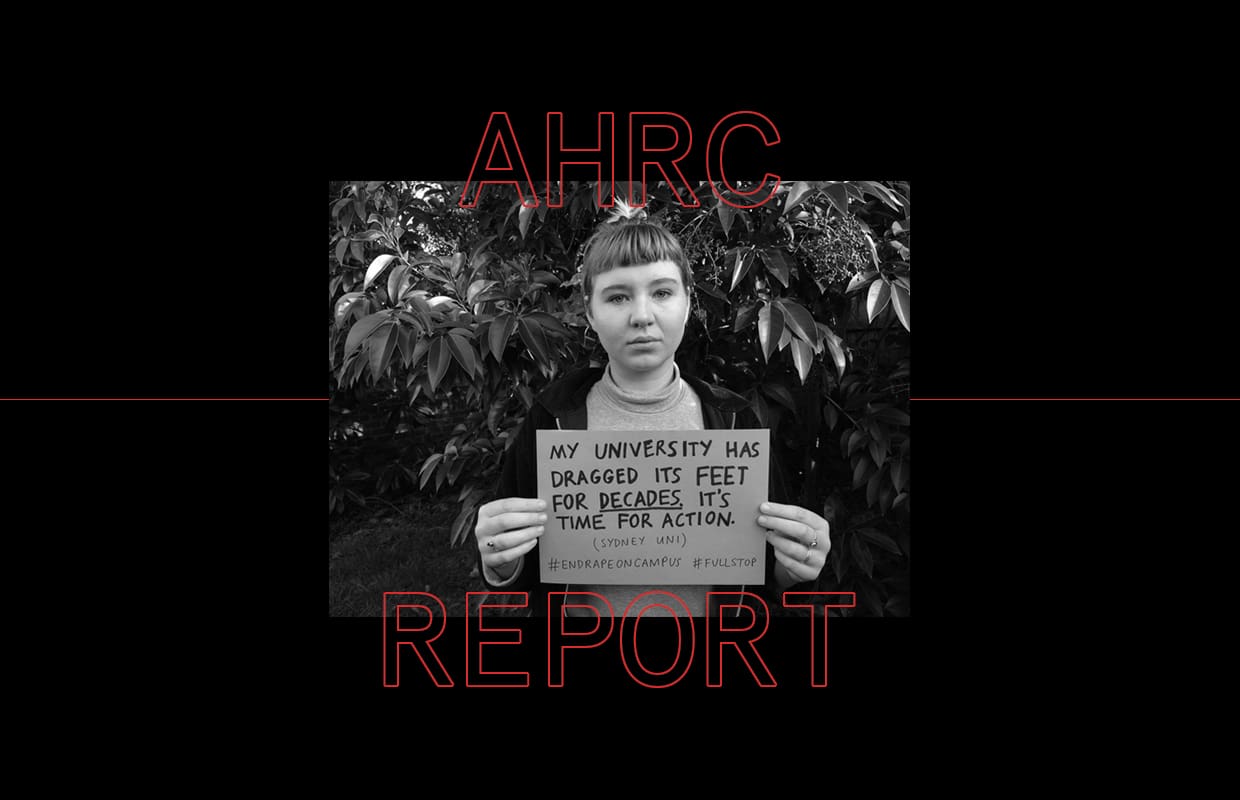“Universities attempting to take credit for the hard work of students and advocates, entrenches a power dynamic that stops survivors from speaking out,” End Rape on Campus (EROC) ambassador Anna Hush tweeted this morning.
She tapped out the post from the Australian Human Rights Commission’s (AHRC) press conference, as they announced the results of their national survey into sexual assault and harassment. Professor Margaret Gardner AO, Vice Chancellor of Monash University and chair of Universities Australia, addressing vice chancellors and media personnel, had made a point of claiming: “we have commissioned this work.”
Unis attempting to take credit for the hard work of students & advocates entrenches a power dynamic that stops survivors from speaking out.
— anna hush (@_annahush) August 1, 2017
The current iteration of the national survey was proposed by the Hunting Ground Australia, a group that aims to engage the public in the campaign against sexual violence at universities, raising $150,000 dollars towards the project. It was only following this feat that Universities Australia, a lobbying body made up of vice chancellors from around the country, decided to jump on board, and later, become the primary funders.
Despite this, Gardner ignored the Hunting Ground Australia’s involvement, telling audiences that it was “at [Universities Australia] request, that the Australian Human Rights Commission surveyed our students so that we could better understand what we needed to do.”
“Leaders from all 39 universities asked the Commission to gather information from our students because we wanted to know what is happening to them,” she said.
“It’s disappointing that universities are trying to reframe the history of this project to claim it as their own victory and congratulate themselves for their bravery when really it is the hard work of students, survivors and advocacy groups that got this project off the ground,” Hush told Honi.
“It’s a massive disservice to all the hard work that has been done to have Universities Australia and vice chancellors blow in and take credit, when really they have been really resistant every step of the way to this type of research being done.”
“In no simple terms, [Universities Australia] have claimed ownership of the survey,” University of Sydney SRC Co-Wom*n’s Officer, Imogen Grant said.
“It was incredibly startling how many of the speakers praised universities, but in discussion of the topic never mentioned survivors or perpetrators either. It’s the survivors who contributed to the report who should be congratulated.”
EROC founder and director, Sharna Bremner, similarly tweeted that she was “devastated” by Universities Australia taking credit for the work of survivors.
Another point of contention has been the university sexual assault hotline launched last week; Universities Australia claimed ownership of the initiative, despite EROC, and journalist and survivor, Nina Funnel, having lobbied for a hotline for months.
The hotline is the result of months of lobbying by @ninafunnell & I. It was NOT Universities Australia's idea. #ChangeTheCourse
— Sharna Bremner (@sharnatweets) August 1, 2017
“Universities Australia were resistant to this idea and it took a lot of EROC and student groups to get this off the ground. And once again Universities Australia came along and said ‘we have this great idea of a hotline’,” said Hush.
“It’s frustrating, especially when the work we do is completely unpaid, or student representatives who are paid less than minimum wage, and vice chancellors who are getting paid a million dollars a year come along and take credit for all that work.”
Student representatives identified several other issues within the report, including the lack of behavioural questions specifically around sexual assault. Behavioural questions ask students about the types of behaviours they have experienced, an industry-standard mechanism designed to get respondents to disclose incidents which they otherwise may not have recognised as assault or harassment. The survey was also only available in English, and did not allow respondents to disclose details of sexual assault or harassment that occurred in a non-university setting.
According to Grant, when a respondent indicated they had suffered an assault in a non-university setting, the online survey automatically ended and the respondent was asked no subsequent questions. This is in contradiction to Universities Australia and USyd policy on the types of incidents that can be reported.
“This reinforces the incorrect belief that if your assault occurred off campus then you cannot report it to your university,” said Grant.
38 minutes in to the AHRC press conference and NO ONE has mentioned PERPETRATORS or OFFENDERS. Why are they being erased? #EndRapeOnCampus
— Nina Funnell (@ninafunnell) August 1, 2017
“The distinction of on and off campus is entirely artificial; any assault can affect a student's mental health and ability to study and that should have been the scope of the survey.”
Despite USyd pledging to implement Universities Australia’s ‘Respect. Now. Always. 10-point action plan (which differs from the AHRC’s recommendations), Grant said students need to keep pressure on the university to adopt best practice standards.
“The university has known about this survey for years, and they have known about this issue for decades, so I think we should be extremely skeptical of any reactionary change of policy by the university,” she said.
Find a break down of the University of Sydney specific results here.
If you have experienced sexual assault or sexual harassment and feel you would like to speak to someone for support or information, NSW Rape Crisis Centre (Phone: 1800 424 017) can provide counselling 24-hours a day, 7 days a week.
A new national University Support Line is available: 1800 572 224
The support line will be available 24 hours a day, 7 days a week. It will operate until 30 November 2017.





